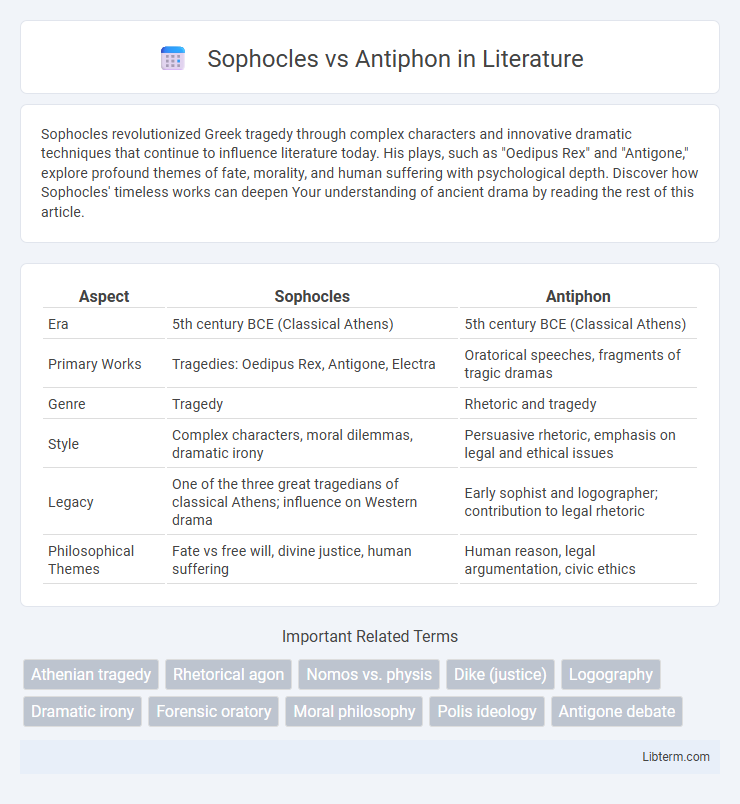Sophocles revolutionized Greek tragedy through complex characters and innovative dramatic techniques that continue to influence literature today. His plays, such as "Oedipus Rex" and "Antigone," explore profound themes of fate, morality, and human suffering with psychological depth. Discover how Sophocles' timeless works can deepen Your understanding of ancient drama by reading the rest of this article.
Table of Comparison
| Aspect | Sophocles | Antiphon |
|---|---|---|
| Era | 5th century BCE (Classical Athens) | 5th century BCE (Classical Athens) |
| Primary Works | Tragedies: Oedipus Rex, Antigone, Electra | Oratorical speeches, fragments of tragic dramas |
| Genre | Tragedy | Rhetoric and tragedy |
| Style | Complex characters, moral dilemmas, dramatic irony | Persuasive rhetoric, emphasis on legal and ethical issues |
| Legacy | One of the three great tragedians of classical Athens; influence on Western drama | Early sophist and logographer; contribution to legal rhetoric |
| Philosophical Themes | Fate vs free will, divine justice, human suffering | Human reason, legal argumentation, civic ethics |
Introduction to Sophocles and Antiphon
Sophocles, a towering figure of classical Athenian tragedy, authored over 120 plays with themes exploring human destiny, justice, and divine influence, notably in works like "Oedipus Rex" and "Antigone." Antiphon, an innovative figure in early Greek rhetoric and oratory, specialized in forensic speeches and is credited with pioneering argumentative techniques critical to Athenian law courts. The contrast between Sophocles' dramatic mastery and Antiphon's rhetorical contributions illustrates the diverse intellectual currents shaping classical Athens.
Historical Context: Classical Athens
Sophocles, a leading tragedian of Classical Athens, thrived during the 5th century BCE, a period marked by the city-state's political power, cultural flowering, and the Peloponnesian War. Antiphon, known as a sophist and orator, operated in the late 5th century BCE amidst the decline of Athenian democracy and the aftermath of the war. Their works reflect the shifting historical context: Sophocles' tragedies explore themes of fate and justice within Athenian religious and civic life, while Antiphon's speeches emphasize rhetoric and legal strategy in a turbulent political landscape.
Literary Contributions of Sophocles
Sophocles revolutionized Greek tragedy through innovations such as introducing the third actor, which expanded dramatic possibilities and deepened character interactions. His works, including masterpieces like "Oedipus Rex" and "Antigone," exemplify complex exploration of fate, morality, and human nature, setting foundational structures for Western literature. Unlike Antiphon, known primarily for his contributions to rhetoric and oratory, Sophocles's enduring legacy lies in his profound impact on dramatic poetry and theatrical conventions.
Philosophical Impact of Antiphon
Antiphon's philosophical impact lies in his pioneering role as one of the earliest Sophists, emphasizing rhetoric and relativism which challenged traditional moral and epistemological views prevailing in Sophocles' era. While Sophocles' works explored divine justice and fate, Antiphon introduced a critical perspective on human reason and law, advocating for natural law over conventional norms. This shift profoundly influenced Athenian intellectual thought by prioritizing human agency and subjective interpretation of truth.
Dramatic Structure vs. Rhetorical Expression
Sophocles' dramas emphasize a complex dramatic structure with well-defined acts, character development, and thematic coherence, creating emotional depth and tragic catharsis. Antiphon, on the other hand, prioritizes rhetorical expression, employing persuasive language and argumentative strategies to enhance courtroom speeches rather than theatrical storytelling. The contrast highlights Sophocles' focus on narrative progression and moral conflict, whereas Antiphon centers on the power of rhetoric to influence and persuade audiences.
Themes of Justice in Their Works
Sophocles explores justice through the moral dilemmas faced by characters like Oedipus and Antigone, emphasizing divine law and individual fate over human legislation. Antiphon, known for his rhetorical skill, treats justice as a social construct governed by human laws and pragmatic reasoning rather than divine authority. The contrast highlights Sophocles' focus on ethical and cosmic justice versus Antiphon's advocacy for legal justice and political order.
Approach to Human Nature and Fate
Sophocles approaches human nature as complex and capable of moral growth, often portraying characters who confront fate with dignity and self-awareness, emphasizing ethical responsibility and the tragic consequences of hubris. Antiphon, in contrast, adopts a more pragmatic and skeptical stance, viewing human nature through rationality and self-interest, downplaying divine influence and fate in favor of human agency and the pursuit of practical success. The divergence reflects Sophocles' emphasis on fate as an unavoidable force shaping destiny, whereas Antiphon advocates for human control over circumstance through reason and calculated action.
Influence on Athenian Society
Sophocles shaped Athenian society through his tragedies, exploring themes of fate, justice, and human suffering that deeply influenced civic values and moral discourse. Antiphon, as a logographer and sophist, impacted Athens by advancing rhetoric and legal argumentation, empowering citizens in the democratic courtroom and shaping public debate. Their contrasting contributions--Sophocles' dramatic literature and Antiphon's rhetorical innovation--both reinforced Athenian identity and societal structure during the classical period.
Legacy in Western Thought
Sophocles' legacy in Western thought endures through his profound exploration of human nature, fate, and morality in classical Greek tragedy, influencing literature, philosophy, and psychoanalysis. Antiphon, known more for his contributions to rhetoric and early forensic oratory, shaped Western legal and rhetorical traditions by emphasizing logical argumentation and persuasion. Both figures leave distinct but complementary legacies: Sophocles through dramatic art and ethical inquiry, Antiphon through foundational developments in rhetoric and jurisprudence.
Comparative Analysis: Lasting Significance
Sophocles' enduring influence in classical literature is marked by his mastery of tragedy, exemplified in works like "Oedipus Rex," which shaped narrative structure and character development in Western drama. Antiphon, though less renowned, contributed significantly to early rhetoric and legal oratory, impacting the evolution of persuasive speech in ancient Athens. The lasting significance of Sophocles lies in his poetic and dramatic innovations, whereas Antiphon's legacy persists mainly within the tradition of forensic rhetoric and early Greek prose.
Sophocles Infographic

 libterm.com
libterm.com